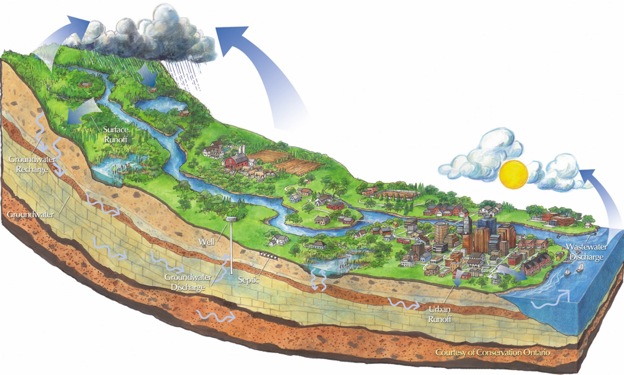






The hydrological cycle is a vast mover of water, sediment, and nutrients from the oceans to the mountain tops. There falling water sculpts landscape and the vegetation on which other life depends.
| Where is groundwater located? | ||
     |
||

 |
||
| hydrological cycle | ||
Round river is an enduring flow.
precipitation vapor liquid
The hydrological cycle or that dance of water morphing across the face of the planet moves evaporated fresh water and assures that some moisture falling and accumulating on the surface of teh land slowly seeps under the ground. Once below the surface, this accumulated water moves at variable speeds depending on the surface seepage, the amount of permeable ground cover, the frequency of replenishment, and the character of the sub surface soil conditions from higher to lower elevations. Some small per cent of the water percolating through the ground is immediately available in areas of porous limestone rock, whereas water trapped under clay layers may be moving for centuries before emerging under pressure as an artesian well to the surface again.
Groundwater is water that exists within soils and broken rocks underneath the ground. Groundwater is a part of the overall hydrologic cycle. It gets into the ground mostly through rain seeping into the soil, a process called infiltration. Sections of soil and/or rock that hold groundwater (think of them as rocky sponges) from which the water can be taken for us to use are called aquifers.
Water is taken from the aquifer to the surface using wells and pumps. Where water is gushing from under the ground from pressure in a spring it is referred to as an artesian well.
![]()
water ethics | water centric | cycle | rivers | deserts | forests | worth of | Aquifers
![]()
use | sector dependency | rivers | Water table | vocabulary | feedback cycle | sources | Eco-terms | links | ecology of | related pages
![]()
Last Updated on 05/26/2013 from 03/01/2007.
By Joseph Siry
schedule | Exchange | Atlas | site-index | Ecology | laws | quick look
Writing | Interviews | Free Writing
Start of this site | Site Map | Overview